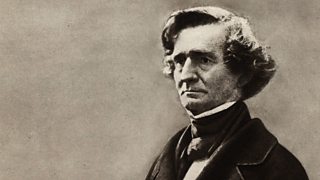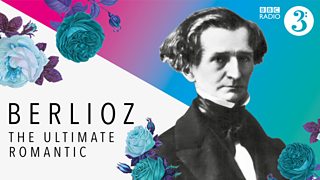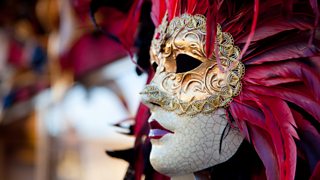Which Romantic composer are you?
From 15-17 February 2019, ����ý Radio 3 goes full-Berlioz! Just after Valentine's Day, we're joining up with the ����ý Orchestras and Choirs for a weekend of live music marking 150 years since the death of the "Ultimate Romantic".
With his passionate music and turbulent love life, Berlioz was one of the most interesting and intriguing composers of the Romantic period. So how do YOU compare – Romantically speaking?
-
![]()
Berlioz – The Ultimate Romantic
Browse all the concerts, programmes and features from an exciting weekend of music.
-
![]()
The ����ý Orchestras and Choirs
Browse all the live music events from this very Romantic weekend.
Sorry, this quiz is no longer available.
Who else could you have been?
Learn about all the composers featured in our quiz
Reveal all the possible answers
Hector Berlioz (1803 – 1869)
Though undoubtedly one of the finest composers of the Romantic era, Berlioz’s actual romantic life was, frankly, a bit worrying. A doctor by training but a musician by choice, for years Berlioz nursed an obsession with the English Shakespearean actress Harriet Smithson. Berlioz didn’t speak English, but that didn’t stop him pursuing Harriet before she finally agreed to marry him, six years later. (In the interim, he plotted the murder of his ex-fiancée and her mother. Oh, and once he and Harriet were married, he cheated on her.)
Before his marriage to Harriet, Berlioz discovered that the only way to assuage the emotional torture of rejection was to compose. Over two months in 1830, he wrote his most enduringly popular work, Symphonie Fantastique. Nakedly autobiographical in nature, the music tells the story of an artist who is rejected, then dreams that he kills his beloved and is sent to hell. Eeek.
You can hear Berlioz’s music performed by the ����ý Orchestras and Choirs throughout the weekend of 15-17 February 2019, as part of Radio 3’s Berlioz – The Ultimate Romantic season.
Pyotr Ilyich Tchaikovsky (1840 – 1893)
Though a talented musician from a very young age, Tchaikovsky was prepared by education for a career in the Russian civil service – and it was at the Imperial School of Jurisprudence that he met his first love: Sergey Kireyev, a fellow student. It’s widely believed that Tchaikovsky, who died at just 53, was gay and spent much of his life tortured by his sexuality. His marriage at 37 to a former student, Antonina Miliukova, was disastrous and extremely short-lived. He never married again.
Tchaikovsky wrote a great deal of large-scale orchestral music, including overtures and symphonies, alongside ballets, concertos and operas. His music is renowned for its passion and intense emotion, alongside moments of great tenderness and romance.
Richard Wagner (1813 – 1883)
Many people nowadays associate Wagner with two things: anti-Semitism and seriously long operas. He certainly held opinions that were as unpopular in his day as they would be now (he even spent 12 years in exile from his native Germany, due to his political activities). As a young man, Wagner was passionate about the theatre. However, it was in composition that he made his mark. He’s best-known for his operas, which included Romantic works including Tannhäuser and Lohengrin as well as lengthy epics like The Ring Cycle. Those theatrical ambitions were realised in Wagner’s new opera house at Bayreuth, designed to be the perfect acoustic and dramatic setting for his own works.
Wagner’s love life was quite complex. He and his first wife, Minna, were married for nearly 30 years, yet both had affairs and they separated multiple times before finally splitting. After Minna died, Wagner found a life partner in Cosima, the daughter of his friend Liszt, who was 24 years Wagner's junior. She was already married, but divorced her husband when Wagner’s first wife died so they could marry. The same year, Wagner composed a piece in Cosima’s honour - the Siegfried Idyll - that he had performed as a surprise on her birthday.
Giuseppe Verdi (1813 – 1901)
Italians wept when Giuseppe Verdi died. An ardent patriot, he lived through a time when Italy’s national identity was being formed. In addition to being a prolific composer, mainly of opera, he served as a politician for four years in the 1960s, and some of his most famous tunes became unofficial anthems of the recently unified nation. In total, Verdi wrote 27 operas, most of them wildly popular, including the tragic love stories Aida and La Traviata, and the out-and-out tragedies, Rigoletto and Il trovatore.
Verdi’s first marriage, to Margharita Barezzi, ended in the deaths of both their young children and Margharita herself in just three short years. Verdi was left heartbroken, but found lasting love later in life with the soprano Giuseppina Strepponi. The couple defied public condemnation by living with each other for ten years before finally marrying in 1859. They remained together until Giuseppina’s death in 1897.
-
![]()
Berlioz - The Ultimate Romantic
Keep up with the activities of the ����ý Orchestras and Choirs over this exciting weekend of music.
-
![]()
Browse Berlioz on ����ý Radio 3
See all our programmes, articles and features for Radio 3's Berlioz celebrations.
-
![]()
Symphonie Fantastique
Hear Berlioz's most celebrated work: the stuff of nightmares, obsessions, and dreams.
-
![]()
Berlioz in film
Matthew Sweet examines cinema's portrayal of composers as tortured souls.




